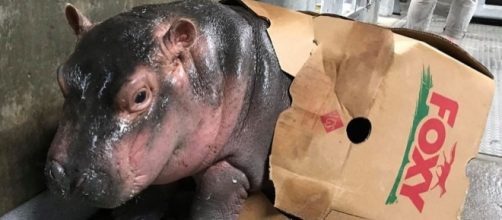It all began in July 2016. Love was in the air at the Hippo Cove of Cincinnati Zoo. Many who had a closer look at the bulky residents—Bibi and Henry—confirmed that the pair was definitely dating—hippo style.
After days of observation, the experts at the zoo led by Dr. Jessye Wojtusik, started performing weekly ultrasounds. Days later, the news was confirmed that 17-year-old Bibi was pregnant with a baby girl.
On January 9, when Cincinnati Zoo started posting the ultrasound update on social media, people were hooked. Bibi started gaining a lot of followers.
Many were curious about the status of the fetus, and if the cub was safe.
On January 24, Bibi and Henry welcomed their newborn to the world.
Michelle Curley, communications director at Cincinnati Zoo, says it was the positive energy and support that poured in from around the world that helped Fiona, the baby hippo, survive.
“We made the decision to share Fiona’s progress because people knew that Bibi was pregnant, thanks to the ultrasound announcement that we made two weeks before she was born. If Fiona didn’t make it, we would have let the public know. Why not let the public hope along with us that she would pull through?” she said.
When the duo met
For 17 long years, Henry, the 35-year-old hippo, led a bachelor’s life.
But life changed for the better when he met Bibi. “Henry is from Dickerson Park Zoo in Missouri. He had been living by himself for 17 years before coming to Cincinnati last summer. He weighs about 3,500 pounds and is completely smitten with Bibi. Bibi came to us in June 2016 from the St. Louis Zoo where she lived in a female bloat,” said Curley.
The hippo diet
Hippos are herbivores. They eat grain, hay, fruits and veggies. Bibi and Henry love romaine lettuce. “Fiona has only eaten grain and hay in addition to her formula,” said Curley.
Cincinnati Zoo is hoping to get Fiona to make a debut sometime in June or July. The baby hippo will be introduced to small groups before she sees a large crowd.
"Fiona was entirely dependent on her human caregivers when she was first born. As a six-week-premature baby weighing only 29 pounds, she was pretty helpless and in critical condition. Her suckling response wasn’t kicking in, so she had to be tube-fed. She was on oxygen 24-hours-a-day and had many health challenges. As each challenge was met and overcome, Fiona was presented with new things to learn in order to move her closer to being reintroduced to her parents. She is spending less time with humans and more time adjacent to her parents. They are able to touch but aren’t sharing the same space yet," said Curley.

